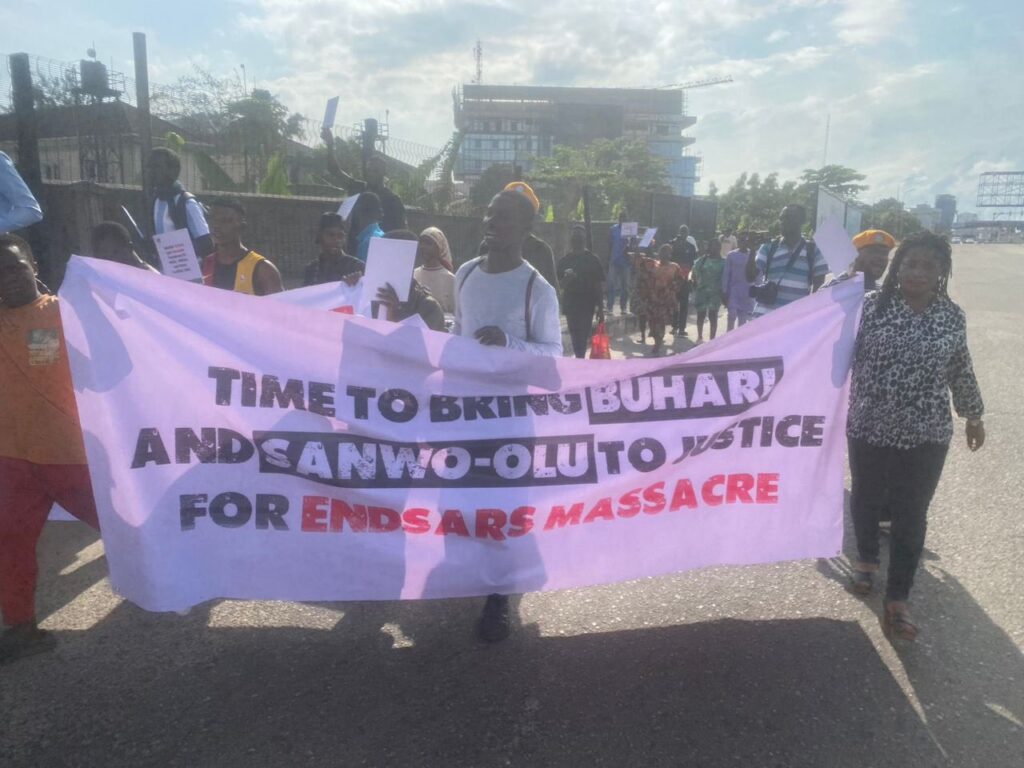On 20 October 2020, peaceful and unarmed protesters were fired at by Nigerian security agents at the Lekki tollgate, bringing the landmark #ENDSARS protests to a violent end.

LAGOS, Nigeria – Police operatives have fired teargas to disperse protesters rallying to mark the fourth anniversary of the #EndSARS protest in Nigeria’s Lagos State.
Videos seen on Sunday morning showed protesters fleeing as the police fired shots.
Several demonstrators fled for safety, while at least two persons were arrested. A source confirmed the arrests, but was unable to identify the detained protesters.
The protesters converged around 8:30 am at the toll gate with several banners and placards, calling for the full implementation of the reports submitted by various judicial panels of inquiry set up after the October 2020 protests, and to honour the memory of those who lost their lives during the protests against police brutality.
“The most senseless police force in the world. Why attack peaceful protesters? Did the @PoliceNG think they can use brute force to save @mbuhari, @officialABAT and @jidesanwoolu for their role on #LekkiTollGate massacre? NEVER!!! #RevolutionNow,” human rights activist Omoyele Sowore wrote on X, accompanied by a video.
However, the spokesman of the Lagos State Police Command, Benjamin Hundeyin, stated that there was no confrontation, adding that operatives had to disperse the protesters to prevent traffic disruption at the Lekki Toll Gate.
“They were told to disperse, but they were adamant; we had to use minimal force to disperse them,” Hundeyin said.
On 20 October 2020, peaceful and unarmed protesters were fired at by Nigerian security agents at the Lekki tollgate, bringing the landmark #ENDSARS protests to a violent end.
The protest had begun organically in Delta State 17 days earlier, expanding to other parts of the country with calls for justice against police brutality in Nigeria.
In December 2021, three victims brought a case before the ECOWAS Court, Obianuju Catherine & 2 Others v. Federal Republic of Nigeria (ECW/CCJ/APP/72/2021), to seek justice for themselves and those impacted by the violations.
The Nigerian government abused the rights of #EndSARS protesters at the Lekki tollgate in October 2020, according to a July 2024 ruling by the Economic Community of West African States (ECOWAS) Community Court of Justice.
In the landmark verdict delivered by Justice Koroma Mohamed Sengu, the Judge Rapporteur, the court flayed the government’s particularly “disproportionate use of force” in response to the #EndSARS protest at the tollgate in Lagos on October 20, 2020.
The court also found that live rounds were shot into the crowd of unarmed protesters.
It asked the Nigerian government to pay a total of ₦2 million in compensation to each victim named in the suit.
The case which was brought before ECOWAS Court by a coalition of human rights activists and organisations, alleged severe violations of fundamental human rights by Nigerian security forces.
Amnesty International also submitted an Amicus Brief, which was declared admissible by the court. After thoroughly examining evidence and testimonies, the court concluded that the Nigerian government’s actions breached several international human rights standards, including Articles 1, 5, 6, 9, 10, and 11 of the African Charter on Human and Peoples’ Rights.
Among many other key findings, the court found credible evidence of disproportionate use of force and violations of the right to liberty and security, assembly, free speech, and dignity. It stated that the use of force was not necessary and contravened the Respondent State’s obligations under the African Charter.
The court also agreed that the applicants had suffered torture at the hands of the Nigerian government. It added that the situation at the Lekki tollgate, where live rounds were shot into the crowd of unarmed protesters, created a situation of fear, and the Nigerian government did not present evidence refuting those allegations.
The court further held that the government failed to allow and afford the applicants their rights to freedom of expression, assembly, and association, therefore violating the applicants’ rights under Articles 9, 10 and 11 of the African Charter.
The government’s actions were deemed inconsistent with Nigeria’s obligations under the ECOWAS Revised Treaty and the African Charter on Human and Peoples’ Rights.
The court held that the quasi-mechanism set up by the government to investigate the allegations of abuse at the Lekki toll gate lacked independence and was questionable.
Consequently, it ordered the Federal Government of Nigeria to pay ₦2 million each in compensation to the applicants.
It also mandated the Nigerian government to conduct investigations into the human rights abuses, with a view to implementing the outcomes of said investigations.
The government was also ordered to report to the court in six months with an update on the compensation and progress of the inquiry.
